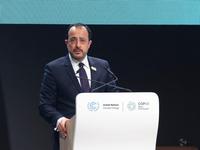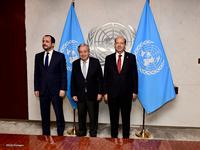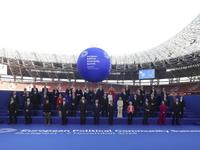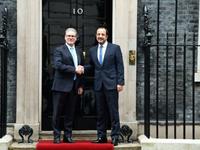Press Releases
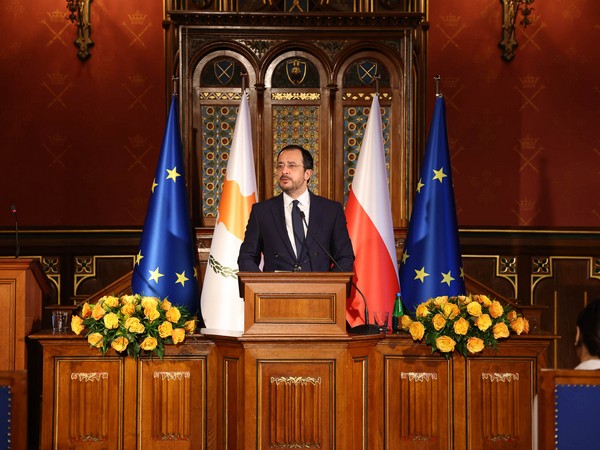
24-05-2024 13:47
Speech of the President of the Republic of Cyprus, Mr Nikos Christodoulides, “Cyprus and Poland – A common vision for the next 20 years of membership to the European Union”
I am honoured to be at the historic Jagiellonian University, on an auspicious day in the relations between Cyprus and Poland:
The first ever, official visit of a President of the Republic of Cyprus to Poland.
It is also my first visit to Krakow. A European city that embodies resilience, renewal and hope, through the most adverse of times. Your city, and all that it symbolises, is also our city, our story, precisely because it forms an essential part of the tapestry of European heritage and of Europe’s long history.
My official visit coincides with the celebration of the 660th anniversary of Jagiellonian University. A journey that started in 1364 and continues to flourish. This is an institution that is a beacon of knowledge, excellence, of innovation. A place where old and new meet, where new visionaries, scientists, and leaders are formed.
It is here, where the future leaders and visionaries of Europe are. Right here. In this auditorium.
I stand before you only days after our countries, Cyprus and Poland, celebrated a milestone, a turning point in their common history: Twenty years since our accession to the European Union.
The historic fifth and largest enlargement of May 2004 proved the force of the enlargement policy in EU integration. An unprecedented and decisive moment for the future of ten countries lying in the Eastern and Southern flank of Europe, as well as for the Union. A moment in history that fulfilled the dreams and aspirations of over 75 million Europeans. A moment that transformed us, new member states, but that was also transformative for the Union.
I vividly recall the euphoric hope that embraced the 1st of May 2004 for all ten new member states, many of whom experienced the second world war on this same continent. Who were fortunate to live to see the rise of a new Europe, certain that your generation, would not endure the curse of war. But at the same time cognisant that peace, that our democracies, and our values are not indestructible. Rather they must be constantly protected, upheld, and strengthened.
It is not an exaggeration to say that up until the 1st of May 2004 the European Union stood as our promised lighthouse, our guiding light but also our port. It symbolised our Ithaca, a beacon of hope. Our future.
Many of you were not even born yet, and I am certain you simply cannot imagine now a Poland outside of the European Union. In the same way that my four daughters and all of the younger generation of EU member states, cannot imagine not being part of our great European family. Not having their lives defined and gradually and consistently improved by EU membership, by the EU acquis.
When Cyprus and Poland joined together the European Union, they were in effect returning to their rightful place, a place of common values, common identity, but also a place of economic and political security that only a group of likeminded, almost half a billion Europeans, can provide. Cyprus and Poland may be distant geographically, but they share so many commonalities, in their identities and trajectories. We have both faced repeated, grave challenges to our sovereignty and independence. Cyprus regrettably is still standing as the last divided EU member state, under military occupation by Turkey, our own big neighbour. We have both endured threats, occupation. We struggled for our independence. And our countries have also rich cultural heritages that is an essential part of the European culture.
Our relations are going from strength to strength, at the bilateral level, with economic relations continuously growing, but also at the multilateral level, and as European partners that see eye to eye on key issues. Poland stands in solidarity with Cyprus in our efforts to reunify Cyprus in line with UN Security Council Resolutions.
And so, as a European leader, as the President of the Republic of Cyprus, and as an academic in my previous life, I treasure this opportunity to engage with you on how we can become part of the evolutionary European process – of the next 20 years in the lifespan of the Union; how do we render the Union, our common home more resilient, more competitive, more strategically autonomous.
In essence, how we build an even greater Union. And in doing so deliver on the promises of the founding visionaries of the European Union, that had the audacity, to imagine, a continent rising from the horror of World War II, where war would not just be unthinkable, but rather impossible.
The first visionaries of the EU planted the seeds for a political project that never made the books of history until they planted them. An unprecedented political, peace project that is perfect in its imperfection – precisely because its imperfection is one of its inherent characteristics, a facet of its evolutionary nature, that allows it to grow. From an economic project, an economic union, to a political union, a social pioneer, a champion of human rights, with the dream of a European federal union. A dream I share. An ever-closer Union.
The discussion of how we build up our Union is not one confined to Brussels. It should be one that leads and informs Brussels. From European citizens. That is one of the reasons the upcoming European elections are so crucial. It is in my opinion a discussion that flows like an interconnected web to Brussels from each and every EU member state, from European citizens, particularly from Europe’s youth - the Union’s present and future. We need to listen and enable our youth a lot more than we do.
Standing with pride on the shore of all we have achieved in the past 20 years of membership in the European Union, I am here to gaze to our future, to discuss with you what our common vision is for the next 20 years.
My basic premise is: Our Union is at an inflection point in its history. Future generations will look back at this moment in time, at the decisions we take to build up the EU.
Now is the time to deliver.
Our Union has been faced with one crisis after another in recent years – from the migration crisis to the economic crisis, the pandemic, the invasion against a sovereign European country, another war on the south eastern border of the Union. We must never forget that Europe is faced with war on two sides of its borders. Because the Middle East is the Union’s neighbhourhood.
Undoubtedly on February 24, 2022 we woke up to a new geopolitical reality, with Ukraine, a sovereign European country invaded, its territorial integrity violated, international legality shattered. Cyprus, a victim of invasion and half a century of continuous occupation by Turkey, has stood in an unwavering, unequivocal manner on the right side of history on the Russian invasion of Ukraine. Cyprus, together with EU are standing on the right side of history.
More recently we woke up yet again to the reality that there are no frozen conflicts, with war ravaging the Middle East.
As a Union we are weathering the storms. We have shown resilience and unity, even though at times it has been extremely challenging to achieve unity and solidarity. These were crises that no EU member state, if it were outside the European family, could face on its own. Let us consider coronavirus vaccines for example and how difficult it would be for individual member states to secure them in the midst of the unprecedented pandemic.
And yet, despite the serious challenges the Union has been facing in recent years, it continues to inspire countries on the European continent and beyond, largely because it has proven that it heals historical divisions. A space of values, security and prosperity. That is why we need to put enlargement back at the forefront of our policies – a transformative, merit-based process anchored on conditionality, that is nothing short of a geopolitical necessity.
And this brings me to my second point: How do we put the foundations for an even greater Union.
The stakes are high. If we do not become drivers in the evolutionary path of the Union now, act to strengthen it, internally and in world, making it more resilient, the Union runs the risk to gradually diminish.
History tells us that at turning points in our European history, the answer has been more Europe, more integration, putting more building blocks in the construction of our Union.
On May 9, 1950, Robert Schuman declared that "Europe will not be created all at once, it will be shaped through concrete achievements that will first create a real solidarity."
Now is the time for more achievements.
At the June European Council, we will adopt the strategic agenda of the Union, about how on the one hand we create a more geopolitical and strategically autonomous Union that is a global actor, and at the same time, how we deliver more and better to our citizens.
That means becoming more competitive, generating job growth, being champions on green and digital transition, transforming into a clean, resource efficient, innovative and competitive economy. In this regard we have two important reports being discussed, the Letta report on the single market, and the upcoming Draghi report on EU competitiveness.
In order to materialise the EU’s geopolitical role first and foremost we must be able to rely on ourselves, without always depending on external, and to some extent volatile, factors. The invasion and ongoing war in Ukraine paved the way in joining forces to promote further strategic autonomy of the Union, in areas such as defense, security and energy. The EU’s strategic autonomy must not remain an abstract idea, but rather must be given flesh and bones and become a reality. In this regard, strengthening the European defence industry can be catalytic.
The EU must be able to have a role and a voice on more than one geopolitical crisis at a time. We have not always been able to do that – for example recently on the Middle East - and we must develop the tools and capacity to be able to do it.
Cyprus, as the EU’s lighthouse in the Eastern Mediterranean, with longstanding excellent relations with all our neighbours, is working hand in hand with the EU, with the European Commission, on building a holistic EU policy with our regional partners such as Egypt, Jordan, Lebanon. We cannot effectively address serious challenges that we face, such as migration without building strategic partnerships with countries of the region.
The crisis in the Middle East also led to the Amalthea Cyprus maritime initiative, which we consider to be our moral duty towards the region, and the civilian population in Gaza. Here again, we worked closely with the European Union, with the Commission supporting the initiative, together with other key partners such as the US and the UAE, and have provided the international community with an effective, supplementary option for the provision of desperately needed humanitarian assistance to Gaza.
Cyprus and Poland, as part of the upcoming trio of the Presidency of the Council of the European Union, assume the Presidency of the Council at such a critical time for our Union. I am very confident, that just like we did in 2012, when we worked together as Trio partners during our first Presidency, that we will stir the Council effectively, as honest brokers, with a common vision for the Union we want, that the generations that will come after us really deserve. I am confident that building on 20 years of membership and experience, our Trio will be even more successful than 2012.
Our European journey is one of promise, hope, transformation. Of strength stemming from unity and solidarity.
I stand firm that as we steer the Union into the next 20 years, the guiding light on the horizon must be more Europe, building a federal Europe, with member states granting even more of their sovereignty to the Union.
For an ever closer, stronger, more resilient Union, that delivers to its citizens.
(NGian/IA)
Relevant Press Releases
